### Understanding the Ever-Evolving Role of Microbiomes in Human Health
In recent years, advances in technology and genomics have catapulted the study of microbiomes to the forefront of medical science. The human microbiome, a complex community of microorganisms that live in and on our bodies, play a role in an escalating list of health and disease states. This article will delve into the microbiome’s significance, its link to overall health, and ways to boost a healthy microbiome.
#### The Ecosystem within Us
The human body, remarkably, hosts trillions of microbes, mainly bacteria, in an ecosystem 100 times more diverse than the number of cells that make up the body itself. This symbiotic relationship forms our microbiome, dominating in areas like the gut, mouth, skin, lungs, and vagina.
Recent research showed the critical role that our microbiomes play in various physiological processes. For example, gut microbiomes aid digestion, produce essential vitamins and short-chain fatty acids, modulate the immune system, and even influence our mood and behavior.
#### Microbiomes: A Health Barometer?
Microbial dysbiosis, an imbalance in the natural flora, has been linked to several health problems ranging from obesity, allergies, inflammatory bowel disease, to neurological disorders like autism and Alzheimer’s. In one study, gut microbes’ diversity in obese individuals was considerably less than their lean counterparts, suggesting that our microbiomes might serve as a health barometer.
Moreover, mounting evidence links poor gut health, often signified by microbial imbalance, with mental health disorders. This connection is known as the gut-brain axis, demonstrating that our mental wellbeing might be partially reliant on a healthy gut microbiome.
#### Cultivating a Healthy Microbiome
If we consider that an overly homogenized microbiome might equate to poor health, then promoting a diverse and balanced microbiome seems logical. So, how can we cultivate a healthy microbiome?
1. **A Balanced Diet**: A diet rich in whole foods, high-fiber vegetables, fruits, legumes, and whole grains can foster a diverse gut flora. Fermented foods like yogurt, kefir, kombucha, and kimchi can also add beneficial microbes to our system.
2. **Regular Exercise**: Physical activity can affect the gut microbial composition. Research indicates that exercise can promote bacterial diversity and produce health-enhancing metabolic by-products.
3. **Minimizing Antibiotic Use**: While antibiotics are crucial for treating bacterial infections, their overuse can disrupt microbial balance. It’s important to use them judiciously as they can wipe out both harmful and beneficial bacteria indiscriminately.
4. **Probiotics and Prebiotics**: Supplements with probiotics (beneficial bacteria) and prebiotics (foods that feed these bacteria) can be helpful in maintaining gut balance, especially when the diet is not optimal.
5. **Lowering Stress**: Chronic stress can disrupt our microbiome balance. Regular relaxation techniques, adequate sleep, and a balanced lifestyle can help maintain microbial equilibrium.
#### In Conclusion
In the final analysis, our microbiomes are critical to our overall health, responsible for a host of processes that directly affect our wellbeing. Understanding this intricate relationship and taking steps to promote a healthy and diverse microbiome could be at the heart of prevention and treatment of various diseases. The evolving field of microbiome science offers promising perspectives for personalized medicine and rekindles the health maxim-‘We truly are what we eat.’


